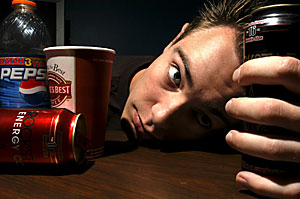 |
|
CLAIRE C. LAURENCE/Arizona Daily Wildcat
|
"I need it almost as much as it needs me. My GPA and MCAT score are proportional to the amount of caffeine flowing through my veins," said physiology senior David Ingram.
|
|
|
By Lisa Rich
Arizona Daily Wildcat
Tuesday, February 22, 2005
Print this
Popping pills and downing cups of coffee may help students stay awake while studying, but it can also lead to unhealthy study habits and a mild drug addiction.
Caffeine is an alkaloid drug with a stimulant action, particularly on the central nervous system, and is generally used to promote wakefulness and mental activity, according to the Campus Health Service online library.
When caffeine enters the body, it is broken down into many different products known as metabolites, which are processed through the body before being excreted into urine, said Sherry Chow, research associate professor at the Arizona Cancer Center.
Chow said some people are sensitive to caffeine because they break down the compound more slowly, which means it stays in the body longer. Regardless of body type, Chow said it is equally possible for anyone to become addicted.
Although caffeine is considered a mild drug, students who consume caffeine-rich products on a daily basis can easily become addicted, said Lisette LeCorgne, a nurse practitioner at Campus Health.
"It's a Catch-22," LeCorgne said. "Students want to make good grades, so often times they take caffeine to stay up late to study."
Students cramming in schoolwork and pulling all-nighters often rely on caffeine more, and may resort to caffeine pills to get their fix.
Almost identical to natural caffeine, pills work in the same way but may contain more caffeine than food or beverage products.
Chow said students should be wary when taking caffeine pills to avoid addiction or unhealthy side effects.
"Pills shouldn't be used on a long-term basis - only occasionally," Chow said.
Depending on caffeine as a study buddy is one major reason students become addicted, which can lead to unhealthy study habits where a student can no longer do work without it, LeCorgne said.
Avid caffeine drinkers who claim, "I'm not addicted," may find themselves mistaken when they try to stop or lessen their caffeine intake, and experience symptoms such as headaches, nausea and vomiting, according to the National Institutes of Health Web site.
Sitting in a lounge chair at Espresso Art café, 942 E. University Blvd., Gary I. Smith, a pre-business sophomore, said a coffee shop is his ideal environment for doing schoolwork, which may lead to his caffeine intake.
"I usually drink coffee when I have more work to get done or I need to stay up to study," Smith said. "It keeps me alert and wakes me up."
Smith said he drinks about seven to 10 cups of coffee a week, which is mostly consumed before or during studying.
"It's my second-favorite drug. The caffeine rush is a sense of euphoria," Smith said. "But I'm not addicted if that's what you're asking."
When consumed in large amounts, Chow said caffeine can cause agitation, jitteriness, anxiety, insomnia, dehydration, bone deterioration, faster heart rate and increased blood pressure.
Miriam Al-Hashimi, a chemistry senior, said she has many friends who are addicted to caffeine and can notice when they go through withdrawal.
"You can tell when they haven't had it yet," Al-Hashimi said. "They're short-tempered, tired and grouchy."
Al-Hashimi said she is not a coffee drinker, but admits to drinking "a couple pitchers" of tea a week. She said she does not experience symptoms of withdrawal, but does feel a difference when she drinks caffeine opposed to water.
"If I need to stay up it helps," Hashimi said. "I'm more alert, I have more adrenaline and I can feel my heart racing."
Chris Smillie, a math and computer science freshman, sat on the edge of his seat while doing homework at Starbucks Coffee. Smillie said he is a caffeine addict and consumes more than nine cups of coffee a week.
"If I don't have it, I crave it," Smillie said. "When I drink it, I get really hyper and I feel different."
Smillie said he never thought of cutting back his caffeine intake, but when he forgoes a day without it, he enjoys not feeling the "jitters."
